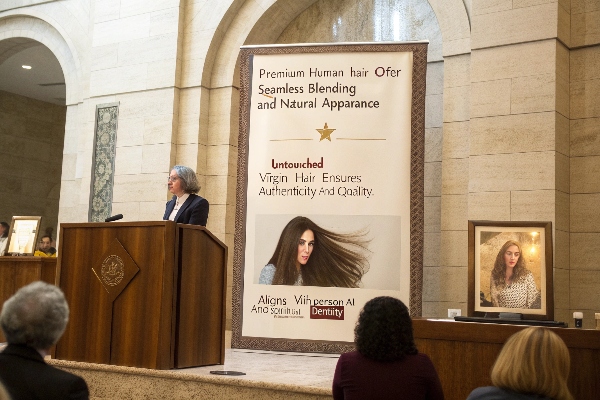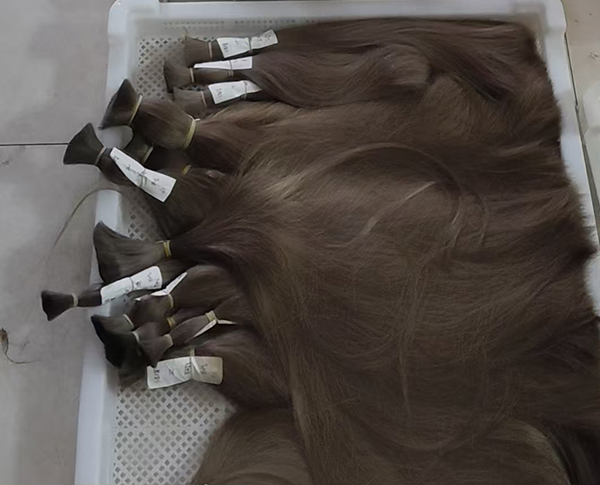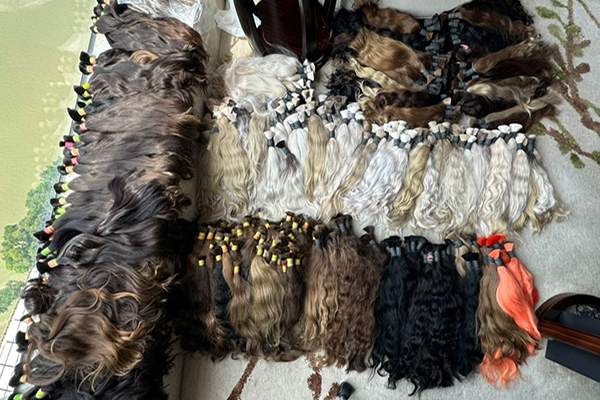The concept of kosher wigs intertwines faith and fashion. What defines them?
Kosher wigs must adhere to Jewish laws concerning modesty and sourcing materials. They are typically crafted without using hair derived from religious rituals that are considered inappropriate, ensuring they meet the standards set by Jewish authorities
This attention to detail not only reflects a commitment to religious observance but also allows women to express their personal style while upholding their beliefs. Respecting these guidelines ensures the wig aligns with religious practices, promoting both elegance and piety.
What Are Jewish Wigs Made Of?
Materials matter in wig crafting. What materials are common for Jewish wigs?
Jewish wigs, known as sheitels, are primarily made from high-quality human hair, allowing them to blend seamlessly with natural hair. Many opt for premium virgin hair, which is untouched and offers a natural appearance and texture.

This choice not only enhances the wig’s aesthetic appeal1 but also provides comfort for daily wear. Additionally, the selection of materials reflects a commitment to authenticity, ensuring that the wig aligns with both personal identity and spiritual needs within the framework of Jewish customs and beliefs2.
What Is a Kosher Wig Made Of?
Religious compliance is key. What constitutes a kosher wig?
Kosher wigs use hair that hasn’t been involved in idolatrous rituals. They often feature unprocessed hair meeting specific ethical considerations.
These wigs often feature unprocessed hair3, which is sourced ethically and responsibly, prioritizing respect for the individuals and communities involved in its collection. This careful selection process not only upholds religious values and guidelines but also provides peace of mind for wearers, allowing them to express their identity while remaining true to their beliefs and traditions.
Are Jewish Wigs Kosher?
Understanding cultural specifics aids comprehension. Are all Jewish wigs kosher?
Not necessarily. To be kosher, a wig must meet certain religious criteria regarding the source of the hair and its treatment.
For instance, the hair should be sourced without any involvement in idolatrous practices and must respect modesty requirements4. Consultation with knowledgeable religious authorities5 or experts is crucial to ensure adherence to these guidelines. This ensures that the wig not only fulfills aesthetic desires but also aligns with the wearer’s faith and commitment to Jewish traditions.
Is Human Hair Kosher?
Examining the source is crucial. Is all human hair considered kosher?
Human hair can be kosher if it comes from a source that follows religious laws. Hair used in some religious ceremonies may not meet these standards.

For example, hair collected from individuals who have participated in certain religious ceremonies may not be acceptable, as it could carry implications that conflict with kosher practices. Proper sourcing is vital, ensuring that the hair is acquired in a way that respects Jewish traditions and guidelines. This careful evaluation of the source guarantees that the hair aligns with kosher principles, providing reassurance to those who prioritize adherence to their faith.
Are Human Hair Wigs Kosher?
Wigs connect to personal and spiritual identity. Are human hair wigs inherently kosher?
Human hair wigs can only be considered kosher if the hair used in their creation meets strict kosher standards. This entails that the origin of the hair and the processing methods must comply with specific Jewish religious laws.
For a wig to be deemed kosher, buyers should verify that the hair has been sourced ethically and without any involvement in idolatrous practices. By thoroughly checking the background of the hair, individuals can ensure its kosher authenticity6, allowing them to uphold their faith while enjoying the personal expression that a human hair wig provides.
What Are Jewish Wigs Called?
Terminology ties to tradition. What are these wigs commonly known as?
Jewish wigs are commonly referred to as "sheitels," a term steeped in cultural and religious significance. These wigs are typically worn by married Orthodox Jewish women as a way to uphold modesty in accordance with traditional beliefs.
The practice of wearing sheitels is deeply rooted in the customs of the community, symbolizing a commitment to both faith and identity. The name "sheitel" itself carries the weight of this cultural heritage, reminding wearers of their role in preserving dignity and modesty while navigating the modern world.
How Are Jewish Wigs Different?
Diversity exists within wig types. How do Jewish wigs stand out?
Jewish wigs, primarily worn by married women, emphasize modesty and adherence to religious norms, setting them apart from typical fashion wigs. They often feature distinct styles that align with traditional values, such as maintaining a natural appearance and covering certain areas of the head

The quality of materials used in sheitels is also paramount, ensuring they are both durable and authentic in appearance. These unique characteristics not only reflect the wearer’s commitment to faith and tradition but also allow for personal expression within the framework of cultural guidelines, achieving a harmonious balance.
When Making a Sheitel, Does It Matter Where the Hair Comes From?
Sourcing reflects deeper values. Is the origin of hair significant?
Absolutely, the origin of the hair used in making a sheitel holds great importance. The hair should be obtained ethically and in strict adherence to kosher guidelines, ensuring that it does not have any ties to practices that conflict with Jewish laws and values.
This attention to sourcing not only demonstrates a commitment to religious principles but also respects the dignity of the individuals from whom the hair is collected. Choosing appropriate sources for the hair embodies a deeper connection to ethical commitments and faith, allowing wearers to honor their beliefs while expressing their identity through their sheitels. Such careful consideration enhances the spiritual significance of the wig and reinforces the values it represents within the community.
Does the Hair Have to Come from Another Jew?
Cultural expectations inform practices. Must the hair source be Jewish?
Not necessarily. While some individuals might prefer hair sourced from within the Jewish community, the primary concern remains that the hair is free from connections to prohibitive or non-kosher practices. It is essential that the hair complies with universal ethical standards rather than being restricted to a specific religious affiliation.

This broader perspective allows for flexibility in sourcing while ensuring that key religious and ethical non-negotiables are upheld. By focusing on these critical guidelines, wearers can maintain their commitment to modesty and faith, regardless of the original background of the hair used in their sheitels. This approach fosters inclusivity while reaffirming the spiritual significance of the wig7 within Jewish culture.
What Is Kosher Hair?
Defining kosher extends to all elements. What makes hair kosher?
Kosher hair is defined by its ethical sourcing and adherence to Jewish law, ensuring that it is free from any connections to idolatrous or inappropriate practices. To qualify as kosher, the hair must be obtained in a manner that aligns with the religious principles that govern various aspects of daily life.
This includes avoiding any involvement in situations that compromise faith or values. Ensuring the kosher status8 of hair requires vigilance throughout the sourcing and processing stages, including verifying the origins and ensuring respect for the individuals from whom the hair is collected. By maintaining these rigorous standards, the resulting sheitels not only serve a practical purpose but also reflect a deep commitment to religious observance, personal dignity, and ethical responsibility. This attention to detail reinforces the spiritual significance of wearing kosher hair within the Jewish community.
Can Any Wig Be a Sheitel?
Not all wigs serve religious functions. Can any wig qualify?
No, not every wig can qualify as a sheitel. To function as a sheitel, a wig must adhere to specific religious requirements concerning style, material, and source. These criteria ensure that the wig aligns with the values of modesty and faith that are central to the practice of wearing a sheitel in Jewish tradition.
This often means selecting wigs that are made from high-quality, ethically sourced materials and designed to provide a natural appearance while covering a woman’s hair appropriately, following cultural norms. Choosing the right wig thus requires careful consideration and alignment with both cultural and religious expectations, allowing wearers to express their individuality while remaining faithful to their commitments. The distinctions involved in selecting a sheitel reflect a deeper connection to Jewish identity and values, making it more than just an accessory—it becomes a significant expression of belief and tradition.
Conclusion
Exploring kosher wigs involves understanding religious laws, ethical sourcing, and the cultural significance within Jewish communities. These components ensure that the sheitel not only enhances beauty but also upholds cherished traditions.
Understanding aesthetic appeal can enhance your fashion choices and improve your overall style. ↩
Exploring Jewish customs can deepen your understanding of cultural identity and spiritual practices. ↩
Exploring this link will provide insights into the advantages of unprocessed hair, enhancing your understanding of wig quality. ↩
Understanding modesty requirements is essential for aligning personal choices with Jewish values and traditions. ↩
Consulting knowledgeable authorities can provide valuable insights and ensure adherence to religious practices. ↩
Understanding kosher authenticity is crucial for ensuring that your wig meets religious standards, allowing for both faith and style. ↩
This resource will provide insights into the cultural and religious importance of wigs, enhancing your appreciation of their role in Jewish traditions. ↩
Understanding the kosher status of hair is crucial for ensuring ethical sourcing and maintaining religious observance. ↩







